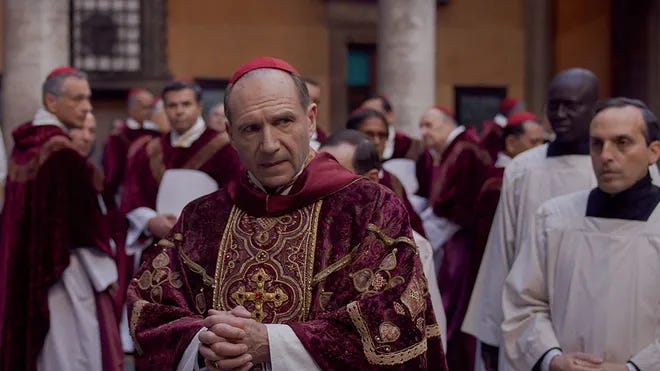"Conclave" Review
Full of suspense... and maybe ideas
I have so many thoughts about this movie, so there will likely be a Part 2 to this review later in the week. This review is spoiler free, but the next one may contain spoilers. So, ya better see the movie.
SPOILER FREE
When the pope dies somewhat suddenly, our protagonist Cardinal Thomas Lawrence— portrayed by Ralph Fiennes— must oversee the selection of a new pope as Dean of the College of Cardinals. This responsibility weighs heavily on him as the cardinals are sequestered for voting and secrets are unveiled. Lawrence must decide where his loyalties lie and what he will sacrifice.
The film is incredibly suspenseful and does a great job of keeping the audience wholly captured despite the limited set pieces or dramatic moments. However, most of the suspense comes from the film’s music and editing. Both are impeccably done and capture the suffocating feeling of being cut out from the outside world while making an important decision. The shots are tight and linger on the characters’ faces until abruptly cutting to black several times. That off-kilter style creates suspense by never letting the audience know when something dramatic is about to happen.
The music, too, is very abrupt and structured. It is reminiscent of church bells that adhere to a sharp schedule. The constant ringing reminds us how much time is passing while the Conclave makes its decision. It also mirrors Lawrence’s nagging conscience as he wrestles with morality. The power of the editing and music to create a clear tone is perhaps the movie’s greatest accomplishment.
As a film about such a significant topic, it follows that many essential ideas and questions emerge. The main conflict is the ideological differences among the factions of the Conclave and how each negotiates in order to win. The film does not shy away from the political nature of these decisions. It even refers to the Conclave as a “war” in which Lawrence must choose a side. While this is an interesting perspective to explore, the film does not push it beyond a mechanism for drama.
Another idea the film attempts to reckon with is the clashing of modernity and tradition. This comes up in debates among the Cardinals, but it is also a thread throughout the movie. There are shots showing the Cardinals on their smart phones and carrying modern suitcases. In preparation for the conclave, there is a shot of the nuns placing all the cardinals’ cell phones in bags to avoid contact with the outside world. This is a plot device since it limits the information Lawrence can access, but it also creates a time capsule inside the Vatican. The Conclave exists without knowledge of what is happening outside. Instead, it is a series of conversations among men dressed in full religious regalia inside walls that are centuries old. It feels as though the walls themselves contain the secrets of the past. Then, when the outside world comes crashing in, it feels like a striking violation.
The material and cinematography present tradition clashing with modernity, but the film comes to no stance or conclusion. While I do not think films always need to create a stance, it does not need to have a reason for bringing issues up. Conclave brings up many interesting ideas pertaining to religion, but it fails to give a reason for them beyond plot devices. The characters never significantly reckon with the consequences of their actions. Bombs are dropped, but everything moves on as before. The story seems to exist in a vacuum.
Perhaps this is the point, but I don’t think so. By the film’s conclusion, it is clearly trying to make an important statement. With a different ending, the film could have made a daring statement about tradition, history, and ambition. However, it could not commit to the social critique it had been inching towards.
Despite the film’s narrative failings, its excellent performances maintain intrigue. Ralph Fiennes is unsurprisingly flawless. His portrayal of Lawrence’s inner conflict feels so genuine that it almost made me uneasy. Stanley Tucci does a wonderful job as the practical Cardinal Bellini, and Caros Diehz does an impressively layered depiction of Cardinal Benitez. While her part is small, Isabella Rossellini’s subtle performance as Sister Agnes captures the camera. Her character has few lines, but Rossellini’s face says all we need to know.
Conclave was highly entertaining and a very intriguing watch. Until the end, I was constantly wondering what would happen next— so much so that I needed to pee for half of the movie but refused to leave my seat. What it lacks in depth, it has in style and talent. I recommend Conclave to anyone who enjoys drama and mystery.



